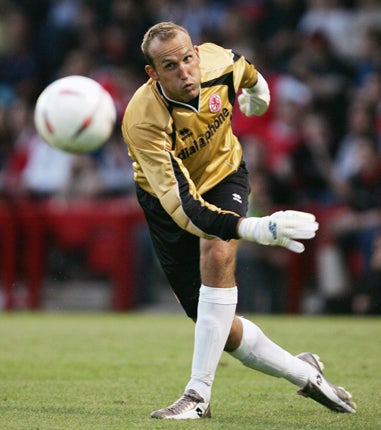Mark Schwarzer: At last, a footballer who is connected to the real world

Two years ago, after Australia were knocked out of the Asia Cup, Mark Schwarzer did not go straight home. Instead, together his wife Paloma, he left Bangkok, where the team had been based, and headed for a refugee camp on the Burmese border.
"There were 9,500 people living in a space which was 900m by 300m trying to live their lives," recalled the Fulham goalkeeper. "Something like 35 per cent will never leave the place, they can't go back to Burma, because they'll be persecuted, and other countries won't take them.
"There are seven or eight camps, and officially they don't exist – the Thai government can't legitimise them, so to speak, because if they did there'd be another huge influx and they couldn't cope. So the buildings are made of bamboo, and have to be taken down and rebuilt every year to prove they are temporary.
"All we can do is our best to help, on the ground – one shack has some computers, run off generators, so people can learn skills which might make them more attractive to other countries – and by informing people."
And that is what Schwarzer, as a special representative for the UN High Commissioner for Refugees, tries to do. As the son of German parents who emigrated to Australia, and married to a woman whose family chose to leave the Philipines rather than live under the Marcos regime, he has always been sensitive to the issues involved in displacement, voluntary or otherwise, and equally aware of the importance of education.
"To me, there is nothing worse than someone with an uninformed opinion. There are always two sides to a story, and you have to try and understand both before reaching a conclusion, if you can reach a conclusion, that is. People say why can't other countries re-home more refugees, instead of being selective, but those governments are under pressure too.
"In the end you can only do what you can. Sometimes I meet influential people, and if I can raise the plight of refugees, perhaps I can do some good."
Talking in one of the Academy rooms at Fulham's Motspur Park training ground, the 37-year-old Schwarzer gestures at the school-style pictures on the wall, 100-plus youngsters of all ages neatly lined up and immaculately kitted out, dreaming of the riches on offer should they eventually graduate to the first-team squad.
"It worries me, because many young people in western societies have so much, and many opportunities to educate themselves, but don't take them, while out there are these people with nothing, and they are so determined."
He leans forward. "And some of them do make it, they do get out, and you see the odds they've overcome, and you just think, 'I am so very, very lucky'."
If Schwarzer has indeed been fortunate, in the way most of us living in a relatively wealthy country are fortunate, he cannot be accused of not making the most of his opportunities.
Struggling to make a breakthrough in the Bundesliga, he played in a trial for Manchester City against Bradford City, and impressed then Bradford manager Chris Kamara sufficiently to get a move to Valley Parade. Thirteen games later the Bantams made a quick and healthy profit by selling him to Middlesbrough, and he made 445 appearances for the Teesside club over 11 years before signing for Fulham.
As such, his opinion on what it takes to keep a medium-sized club in the Premier League is very much informed. "Quality and experience. Which is why last season Middlesbrough were always likely to have it tough. The amount of experience they let go and didn't replace was the key."
For the same reason he believes Australia could make a real impact in South Africa. "We were good in 2006, reaching the last 16 and losing to Italy to a last-minute penalty, but even then we had only four or five well-known and experienced players. Now we have a squad full and we have the backing of a country where the interest in football has exploded in the last four or five years." This pleases him in more ways than one. "Of all the major sports – and soccer is a major sport in Australia now – soccer unifies the country. We have players with all racial and national backgrounds, and that's a very important thing in bringing the country together."
And to think sometimes footballers are accused of being disconnected from the real world.
Today's Games
Fulham v Sunderland (3.0)
Sunderland's prominent position in the table is based almost entirely on home form, five wins being matched by the same number of defeats on those long away trips. Several of them have angered Steve Bruce, who wants an improvement against a team only a point behind them.
Everton v Spurs (Sky Sports 1, 4.0)
There is no end to Everton's injury problems, a win in Athens bringing qualification in the Europa League but leaving six players doubtful for this game. If Spurs can't take advantage, their prospects of cementing a place in the top four will begin to look unrealistic.
Steve Tongue
Join our commenting forum
Join thought-provoking conversations, follow other Independent readers and see their replies
Comments